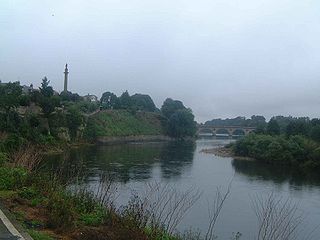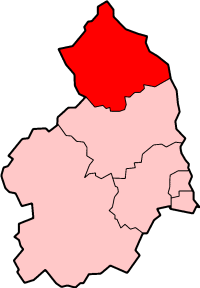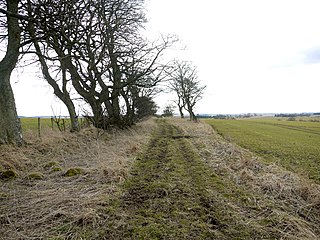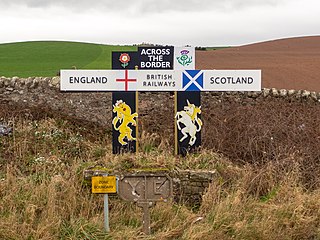
Berwick-upon-Tweed is a town in the county of Northumberland. It is the northernmost town in England, at the mouth of the River Tweed on the east coast, 2 1⁄2 miles (4 km) south of the Scottish border. Berwick is approximately 56 miles (90 km) east-south east of Edinburgh, 65 miles (105 km) north of Newcastle upon Tyne and 345 miles (555 km) north of London.

The River Tweed, or Tweed Water, is a river 97 miles (156 km) long that flows east across the Border region in Scotland and northern England. Tweed (cloth) derives its name from its association with the River Tweed. The Tweed is one of the great salmon rivers of Britain and the only river in England where an Environment Agency rod licence is not required for angling. Tweed is an Old Brythonic (Celtic) name meaning 'border'.

Islandshire was an area of Northumberland, England, comprising Lindisfarne or Holy Island, plus five parishes on the mainland.

Berwick-upon-Tweed was a local government district and borough in Northumberland in the north-east of England, on the border with Scotland. The district had a resident population of 25,949 according to the 2001 census, which also notes that it is the most ethnically homogeneous in the country, with 99.6% of the population recording themselves in the 2001 census as White. It was also the smallest district in England with borough status, and the third-least densely populated local government district.

Edward Marjoribanks, 2nd Baron Tweedmouth, was a moderate British Liberal Party statesman who sat in the House of Commons from 1880 until 1894 when he inherited his peerage and then sat in the House of Lords. He served in various capacities in the Liberal governments of the late 19th and early 20th centuries.

The Tweed River is a river situated in the Northern Rivers district of New South Wales, Australia. It has a mature wave dominated, barrier estuary. From the middle reaches of its course, the state boundary between New South Wales and Queensland is located approximately 10 kilometres (6.2 mi) north of the Tweed River.

Berwick Bridge, also known as the Old Bridge, spans the River Tweed in Berwick-upon-Tweed, Northumberland, England. The current structure is a Grade I listed stone bridge built between 1611 and 1624.

Berwick-upon-Tweed railway station is on the East Coast Main Line in the United Kingdom, serving the town of Berwick-upon-Tweed, Northumberland. It is 335 miles 56 chains (540.3 km) down the line from London King's Cross and is situated between Chathill to the south and Dunbar to the north. Its three-letter station code is BWK.

Ord is a civil parish in Northumberland, England. According to the 2001 census it had a population 1,365, increasing slightly to 1,374 at the 2011 Census. The parish is situated to the south-west of the town of Berwick-upon-Tweed, and includes the settlements of East Ord and Murton. The parish is bound to the north by the River Tweed, and to the south by the Aller Dean.

The Tweed Water Spaniel, or Tweed Spaniel, is a breed of dog extinct since the 19th century. It is best known for being involved in the early development of the modern Curly Coated Retriever and Golden Retriever breeds of dogs. They were described as generally brown, athletic dogs from the area around Berwick-upon-Tweed near the River Tweed and close to the Scottish Borders. A type of water dog, the breed was not well known outside the local area. This breed may have been created by crossing local water dogs with imported St. John's water dog, another breed which is also now extinct.
Tweedmouth railway station was a railway station which served the Tweedmouth area of Berwick-on-Tweed in Northumberland, England. It was located on the East Coast Main Line. As well as a railway station for passengers, it was also the main service yard and goods yard between Newcastle upon Tyne and Edinburgh. Also Tweedmouth station was the terminus for the Tweed Valley Railway line, which connected the East Coast Main Line with the Waverley Line at Newtown St. Boswells. The station lies to the south of the Royal Border Bridge.

The Devil's Causeway is a Roman road in Northumberland, in North East England. It branches off Dere Street north of Corbridge and can be traced through Northumberland for about 55 miles (89 km) north to Berwick-upon-Tweed.
Coldstream railway station served the town of Coldstream in Berwickshire, Scotland although the station was across the River Tweed in Northumberland, England. The station was on both the Alnwick to Cornhill Branch which ran from Alnwick to Cornhill Junction on the Kelso line near Coldstream and the Kelso to Tweedmouth line.
The Kelso Branch was a 23.5 miles (37.8 km) twin track branch railway in Northumberland, England and Roxburghshire, Scotland that ran from Tweedmouth on the East Coast Main Line via seven intermediate stations to Kelso.

Berwick-upon-Tweed television relay station is a low-power television and FM radio relay transmitter of Chatton, covering Berwick-upon-Tweed, Tweedmouth and Spittal, Northumberland. It is owned and operated by Arqiva.

Thomas Grey (1863-1928) was an English poet who wrote about his local area of the Scottish Borders, the First World War and rail transport.

Marshall Meadows Bay is the northernmost point of England. It is located on the Northumberland coast, 2.5 miles (4.0 km) to the north of Berwick-upon-Tweed, and just to the south of the Anglo-Scottish border. Across the border in Scotland is the county of Berwickshire in the Borders region. The hamlet of Marshall Meadows lies to the west of the bay, and is the most northerly inhabited place in England. The Marshall Meadows Country House Hotel is here, along with a farm and a caravan site. There is a disused tunnel from the caravan site to the bay below. Nearby is the A1 trunk road and the East Coast Main Line railway.

Tweedmouth Rangers Football Club is a football team in the town of Berwick-upon-Tweed, England, just south of the border with Scotland.
Beal railway station, also known as Beal for Holy Island railway station, was a railway station that served the village of Beal, Northumberland, England from 1847 to 1968 on the East Coast Main Line.













